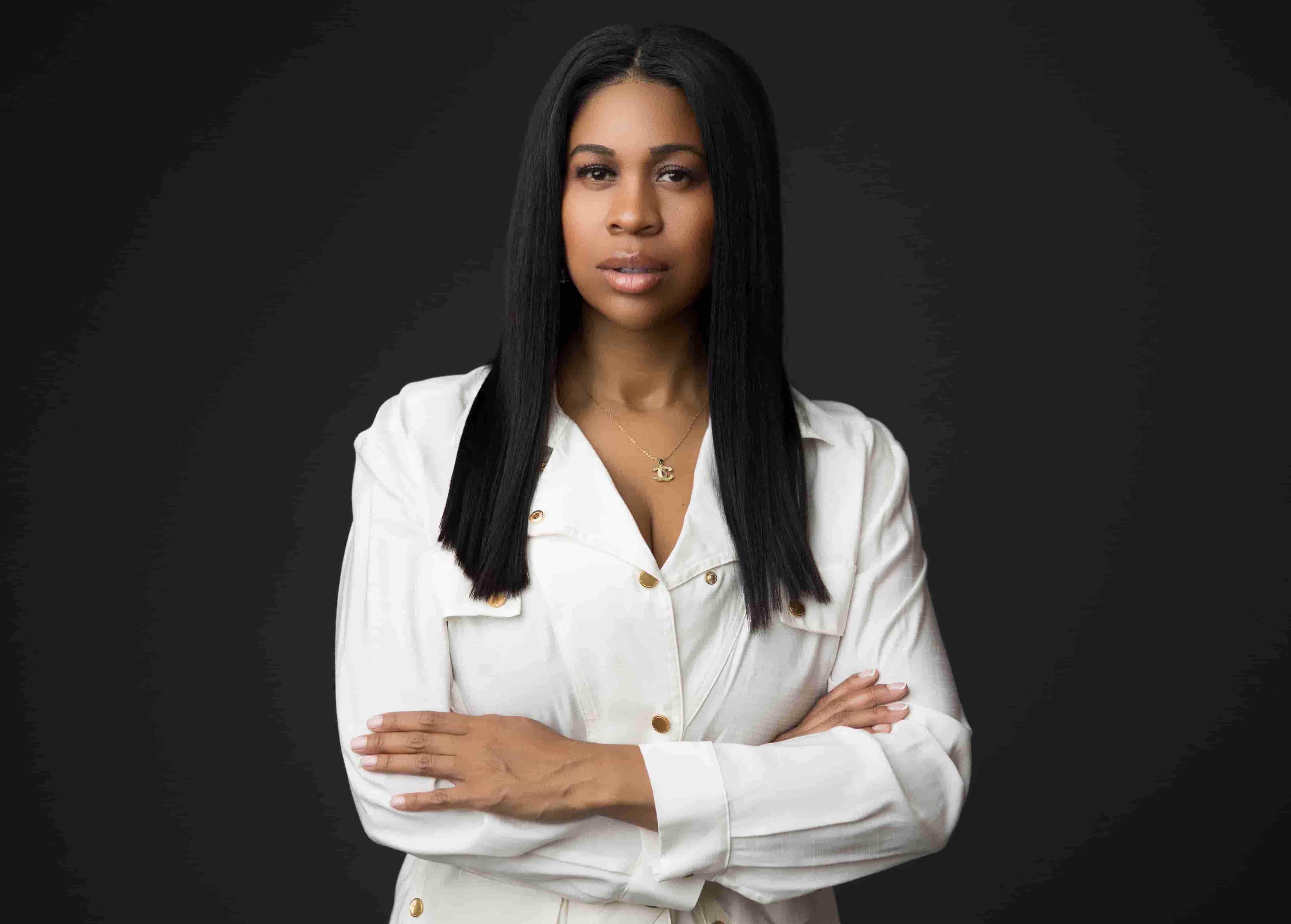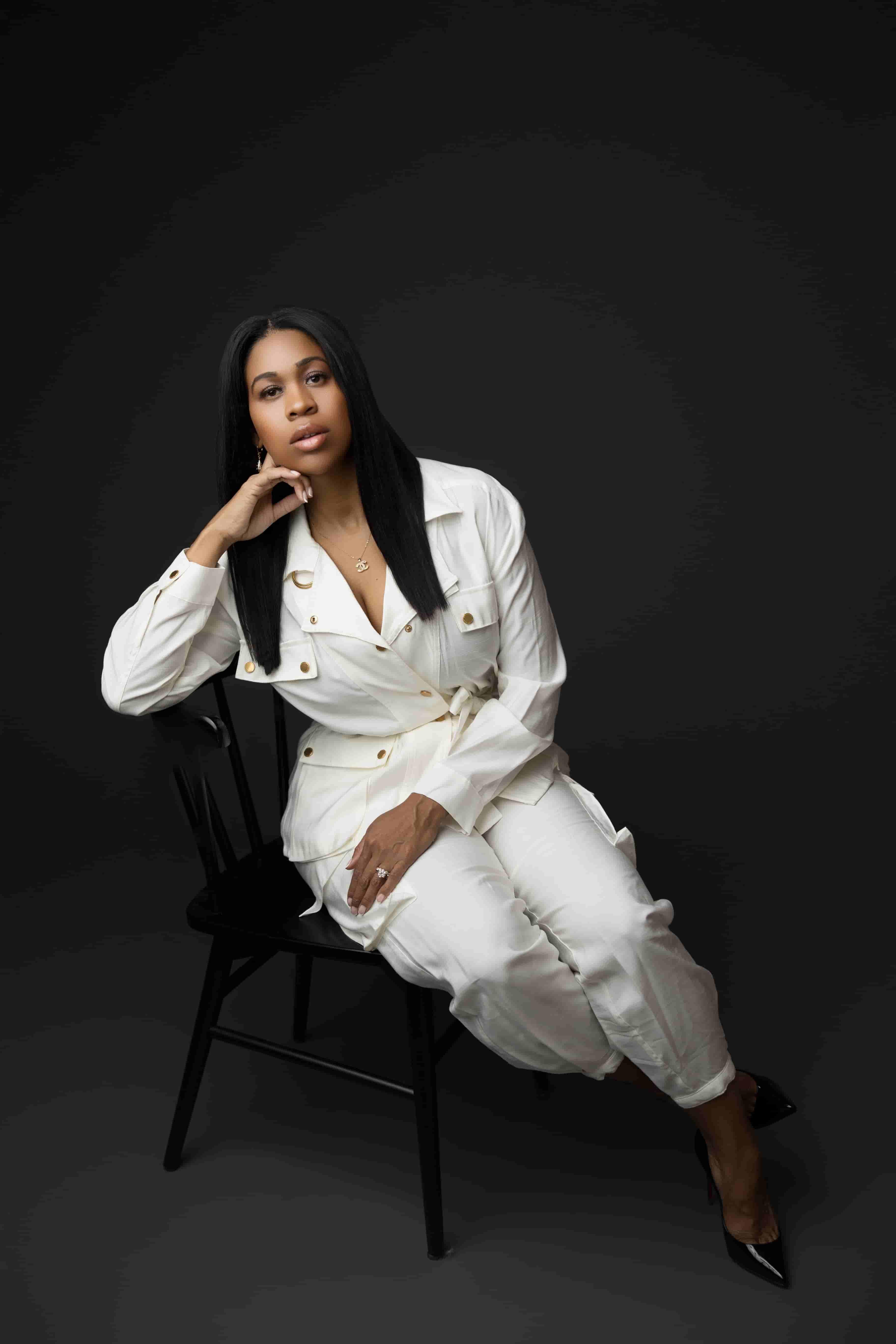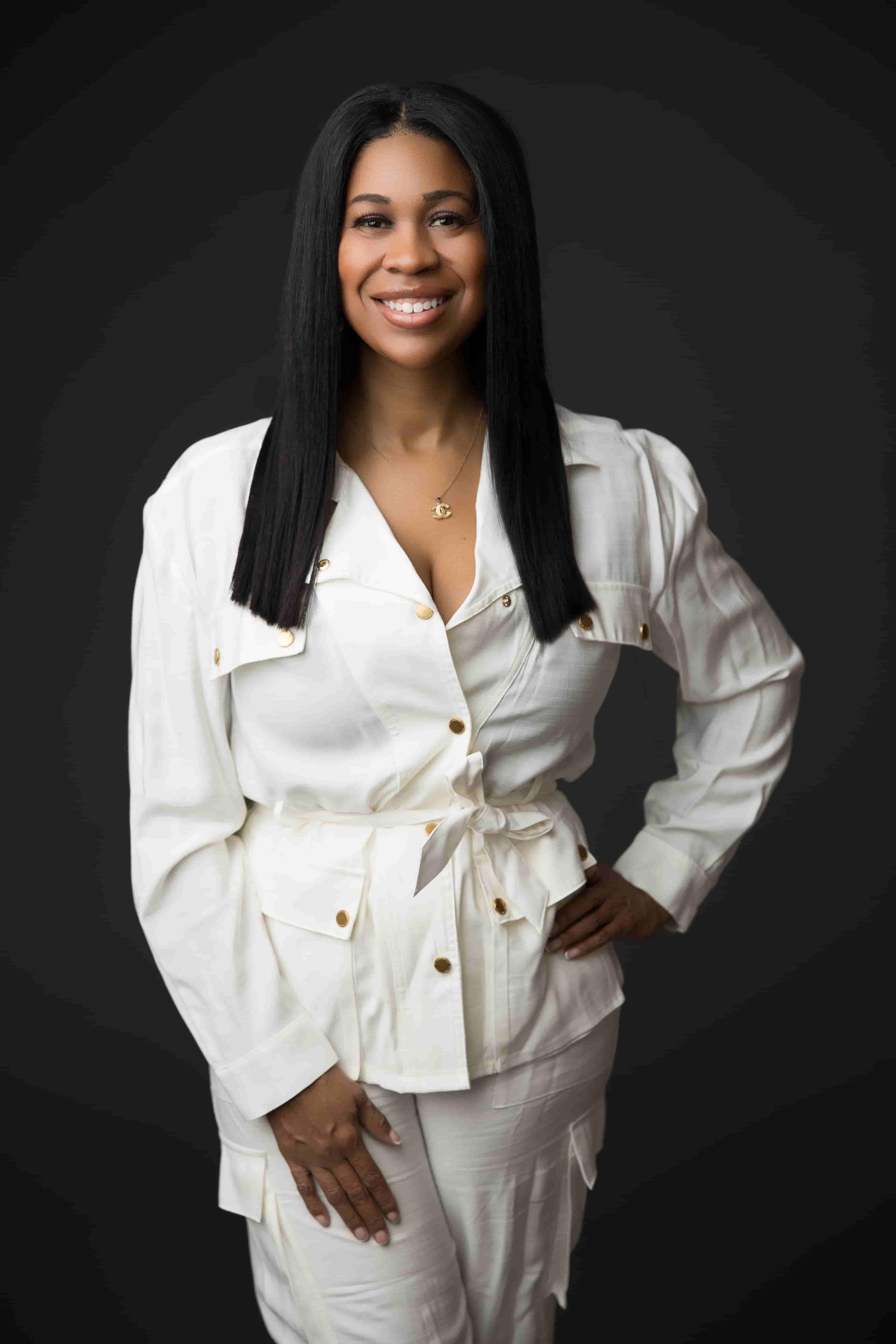
Blake Richardson: How a Tech Industry Powerhouse Is Reshaping Entertainment Law and Building a Legacy in the Web3 Era
Meet Blake Richardson, one of the youngest Black women to serve as Chief Legal Officer in the tech industry. From sports law to NFTs, this feature explores how she’s transforming digital ownership while redefining what it means to lead.
By Zawadi StithAug. 8 2025, Updated 5:50 p.m. ET
A trailblazer by nature, Blake Richardson might be one of the highest-achieving women I’ve spoken to in recent memory. From blockchain deals to new motherhood, she continues to set the bar well beyond the average reach. In conversation, a recurring theme emerged: confidence. You don’t become one of the youngest Chief Legal Officers in the tech industry without it.
At first glance, one might assume her confidence has always come naturally, and to some degree, it has. However, upon closer examination of her remarkable rise in both law and tech, it becomes clear that this self-assurance was cultivated over time. Richardson credits her unwavering belief in herself to two powerful forces: faith and family.
“Hands down, my mother,” she says, when asked where she draws her confidence from.
Growing up in Baltimore, Maryland, Richardson had a front-row seat to excellence. Her mother, a serial entrepreneur, built multiple businesses and made legacy a family mandate. “She would always say, 'I'm going to make sure I establish a legacy for our family.'” And she did just that.
Richardson witnessed executive decision-making early. Her mother often brought her to the office, including her in meetings and showing her what it meant to lead with both strength and humility. The family eventually relocated to Scottsdale, Arizona, after her mother sold one of her companies to investors in the area. They fell in love with the city and decided to stay.
“If God woke you up that day, you still have a purpose,” was a guiding mantra from her mom. For Richardson, watching a Black woman navigate and thrive in male-dominated industries illustrated the footing for her own career. It wasn’t just about being in the room—it was about owning it.
Reflecting on the early moments that shaped her confidence, Richardson recalled a holiday party she once attended with her mother. As they scanned the room filled with executives, her mother leaned in and offered a powerful reminder: “Even if you don’t see a face that looks like yours, know that there is space for you in every room you step into.” The words didn’t just land—they lingered, becoming a foundational belief that continues to guide Richardson through every space she enters.
“I don’t have to compromise my beliefs or principles to be in the position God has destined for me,” she tells me. That clarity has given her the courage to walk away from opportunities that didn’t align with her values, and the confidence to speak her vision—whether to colleagues or CEOs—with unwavering conviction.
Her confidence allowed her to pivot when it mattered most. She began her career in public relations for the Phoenix Suns, one of her favorite teams from her childhood. She worked closely with athletes and the media, managing client images and relationships with player-owners. It was a dream job for a sports fanatic, but Richardson wanted more.
In a conversation with a mentor at the Suns, she expressed curiosity about player contracts and deal-making. The mentor said jokingly, “You should go to law school and come back to represent the Suns,” and Richardson did exactly that.
At law school, she excelled, serving as President of the Sports Law Association and securing competitive internships, including a coveted role at NBCUniversal. Her time there sharpened her legal skills and deepened her understanding of the entertainment and sports industries. By the time she returned to Arizona to begin her legal career with the Phoenix Suns, she was well-prepared to navigate high-stakes, high-visibility work.

It was during her time with the Suns that the industry’s shift toward digital innovation became personal. One day, an NFT (non-fungible token) deal landed on her desk—her first real exposure to blockchain-based assets in a legal context. The entertainment industry was no longer just about traditional formats; it was rapidly embracing decentralized platforms, digital ownership, and new forms of fan engagement. For Richardson, it was a eureka moment.
For those unfamiliar, NFTs are unique digital assets verified via blockchain technology. Unlike cryptocurrency, NFTs can’t be exchanged one-for-one. They represent everything from digital art and trading cards to virtual real estate. They were turning digital ownership on its head—and for Richardson, it felt like a glimpse into the future. Her parents had invested early in cryptocurrency like Bitcoin, so blockchain technology wasn’t entirely foreign. But this was different. This wasn’t just about value—it was about empowerment. She saw a real opportunity to help athletes and artists take control of their creative output in ways that had never been possible before.
“It was a win-win-win situation,” she says. “The fans feel like they’re part of the journey, the entertainers own their brand outright, and everyone wins with minimal risk.”
Her passion for protecting talent had found its match in blockchain technology. Word of her growing expertise began to spread. Not long after, a mentor tipped her off to a legal opportunity at Gala Games—a Web3 entertainment company with bold ambitions. They were building out their entertainment division but hadn’t yet found someone who could fluently speak both the language of the law and the fast-evolving world of crypto. Richardson wasn’t just a great fit—it was as if the role was intentionally designed for her.
Before accepting the role, Richardson sat down with Gala’s CEO to ensure their visions were aligned. It wasn’t just about joining a fast-growing company—it was about joining a movement. “They were clear about wanting fair deals where everyone wins,” she recalls. That ethos resonated deeply with her. She wasn’t interested in deals that simply looked good on paper; she wanted outcomes that uplifted creators, respected innovation, and reflected her core values around equity and empowerment.
She accepted the role and began her tenure as General Counsel. But her impact was swift and unmistakable. Within just a few months, she was elevated to Chief Legal Officer—a testament not only to her legal acumen but also to her ability to lead with both vision and integrity in a space still defining itself.
Gala Games, where Richardson would help shape legal and strategic direction, is more than just a Web3 company—it’s a global juggernaut operating in over 50 countries. In its first year alone, Gala generated $2 billion in revenue, signaling not just growth, but serious disruption. The company sits at the intersection of gaming, music, and film, pushing the boundaries of how content is owned, distributed, and monetized. Perhaps most notably, Gala flips the script on traditional entertainment economics: instead of creators receiving a sliver of profits, the platform allows artists to retain the majority share, a rarity in an industry where ownership often rests far from the talent.
But reaching the C-suite wasn’t Richardson’s most difficult feat. The real challenge was subtler—and far more personal. Carving out a respected, confident voice in boardrooms where few looked like her required both inner conviction and external resilience. “The number one obstacle was making sure I built up confidence in having a voice and not being afraid to use it,” she reflects. Her presence in these spaces is an act of quiet defiance, a reminder that young Black women are not just capable—they are necessary at the highest levels of decision-making.
Key to that evolution was mentorship.
“It’s a two-way street,” she explains. Richardson believes mentorship must be intentional on both sides. She encourages professionals to actively contact their alma maters and ask if any students are seeking guidance. “We should be held just as accountable,” she says. For young professionals, her advice is equally clear: “Make yourself visible, build your voice, and then reach out to someone whose values align with yours.”
To Richardson, mentorship is more than a helping hand—it’s illumination. “It’s like walking down a dark road and having lights turn on with every step you take,” she says. It can affirm direction, offer unexpected insight, and—just as importantly—course-correct misaligned paths. She recalls, with a smile, the time she thought she wanted to be a doctor. After shadowing at a clinic, she quickly realized she couldn’t stomach the sight of blood. That honest moment redirected her, and she’s never looked back.
In addition to mentorship, Richardson champions financial literacy as a foundational value, particularly for communities historically excluded from wealth-building opportunities. “Black women have been movers and shakers in every industry for decades,” she says. “But to build a legacy, you need financial stability and beyond.” She urges young professionals to start with small, practical steps, such as opening high-yield savings accounts (like those offered by Marcus by Goldman Sachs), learning about stocks, exploring grants, and practicing financial affirmations.
“You want your uniqueness to be backed by finances,” she explains. “You always want your money making money for you.”
That intersection—between emotional intelligence and financial empowerment—is where Richardson’s leadership truly stands apart. At USC, she founded a program aimed at teaching emotional literacy to elementary school students, dedicating just two hours a week to classroom instruction. The impact was immediate. One student opened up about personal tragedy in a way no one had expected—proof, Richardson says, that giving children tools for emotional expression can change the trajectory of their lives. “Expressing emotional literacy can change lives,” she reflects.
When asked what advice she would give to other ambitious women navigating complex career paths, she doesn’t hesitate:
“Think outside of the box. Add value beyond your job description. Learn about other departments. Become an expert even before someone gives you the title. Build your network. Read constantly.”
To Richardson, leadership is as much about curiosity as it is about credentials. It’s about constantly learning, bridging knowledge gaps, and positioning yourself as a thought leader in spaces that may not yet recognize your value. In an industry as fast-evolving as Web3, those who thrive aren’t just technically skilled—they’re endlessly curious and unapologetically bold.

Now, as a new mother, Richardson has added yet another milestone to her growing list. And while her professional life is dynamic and demanding, she’s intentional about nurturing joy and balance at home. Her version of self-care is deeply human: dancing in her living room to amazing music, laughing with close friends, and surrounding herself with sticky notes of positive affirmations, much like the main character in Being Mary Jane, minus the chaos and drama. These daily rituals are grounding forces in a life otherwise spent navigating high-stakes boardrooms and bold technological frontiers.
Her story is a powerful reminder that success isn’t always linear and that fulfillment doesn’t require sacrificing authenticity. Sometimes the most defining breakthroughs happen not just in offices or negotiations, but in the quiet, joyful moments that center us.
And if Blake Richardson is involved, chances are it will turn to gold.

